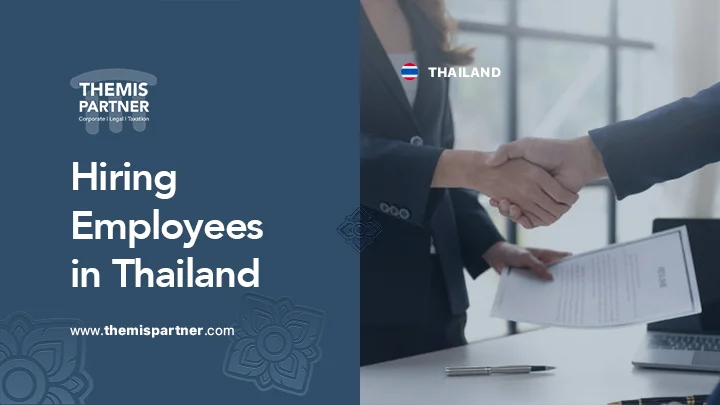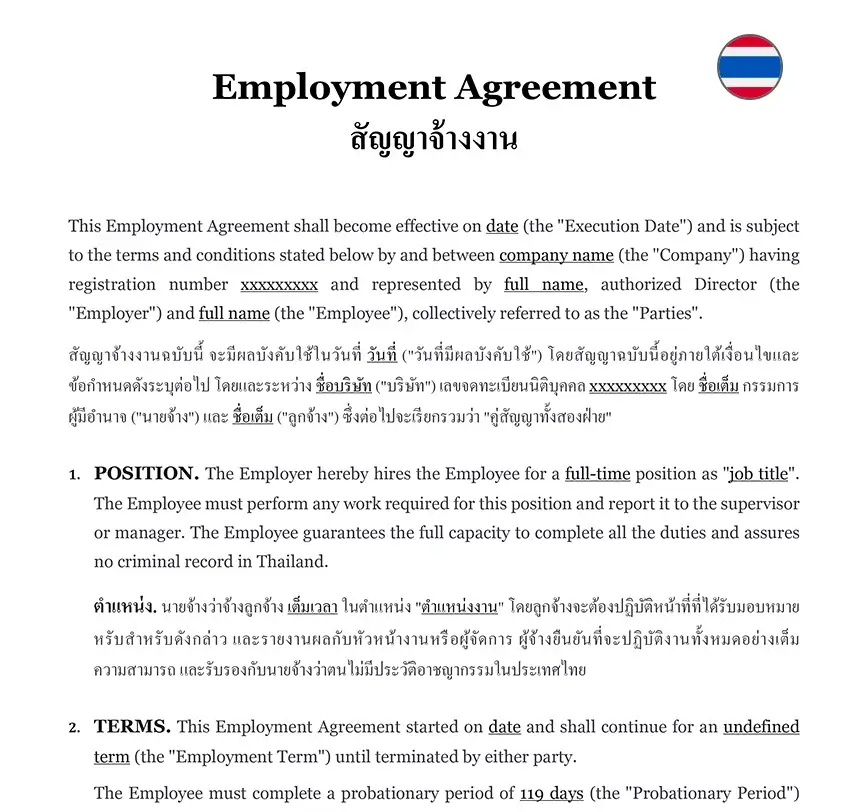Hiring employees in Thailand in 2025 means navigating more digital processes and stricter legal requirements than ever before: Bangkok’s minimum wage has hit 400 baht per day, and electronic contracts are now a compliance requirement for every employer.
Are you confident your current hiring approach meets Thailand’s evolving standards for wage, tax and data security?

Stay ahead of regulatory changes and attract top talent by aligning your hiring process with Thailand’s most recent labour trends.
Key Takeaways
-
Thailand’s 2025 laws raise Bangkok’s minimum wage to 400 baht/day, expand parental leave, and validate digital contracts.
-
Use legally recognized e-signatures and secure storage for all employee records.
-
Register employees and contribute 5% to the Social Security Fund (max 750 baht/month).
-
Draft compliant contracts with clear clauses on pay, hours, probation (max 119 days), and termination.
-
Recruit via Thai job boards and highlight company culture to attract top talent.
-
Streamline onboarding with verified documents and digital contracts to cut turnover.
-
Account for full hiring costs, benefits, and payroll tech (avg. 5,000-10,000 baht per hire).
-
For foreign staff, ensure work permits and capital compliance, or use an EOR service to simplify hiring.
Looking to outsource HR & payroll?
Our team handle payroll, HR administration, PEO employment, and full visa and relocation support.
Table of Contents
-
Legal Requirements for Hiring Employees in Thailand
-
Structuring Employment Contracts in Thailand
-
Step-by-Step Hiring and Recruitment Process
-
Navigating Costs, Compensation, and Benefits
-
Hiring Foreign Employees and Strategic Compliance
-
FAQ: Hiring Employees in Thailand
-
Conclusion
Legal Requirements for Hiring Employees in Thailand
What Are the Key Employment Laws in 2025?
Hiring employees in Thailand requires compliance with the latest updates to the Labor Protection Act (LPA) and supporting regulations.
In 2025, employers must address:
- Minimum wage increases: Bangkok’s daily minimum wage is now 400 baht, and rates vary by province.
- Expanded paid parental leave: Employers should monitor final requirements, as policies are being updated.
- Recognition of electronic contracts and digital personnel records for all employment types.
- New protections for gig and temporary workers, impacting contractor agreements.
Data privacy regulations now require secure handling and storage of employee information in digital formats. Electronic employment contracts are legally recognized if properly executed, per the Electronic Transactions Act.
Visit the Ministry of Labour Thailand regularly for current legal updates.
Digital employment records and e-contracts are now a compliance requirement for every employer in Thailand.
What Compliance Steps Must Employers Follow?
For a compliant hiring process in Thailand, employers must:
- Register with the Department of Business Development.
- Set up payroll with accurate tax withholding and Social Security Fund contributions.
- Draft compliant employment contracts covering wage, hours, benefits, and leave.
- Register employees for government benefits and maintain secure electronic records at all times.
Foreign employers should pay close attention to licensing requirements and timely registration to avoid significant penalties for delayed compliance.
Failing to follow these steps can cause legal complications, slow onboarding, and financial penalties.
Structuring Employment Contracts in Thailand
Which Clauses and Terms Are Mandatory in Employment Contracts?
Every Employment Contract in Thailand must meet specific regulatory standards. Compliance with the Labor Protection Act is essential for avoiding disputes.
Key clauses that must be included are:
- Minimum wage (currently at least 400 baht per day in Bangkok)
- Working hours and overtime
- Probation period (usually up to 119 days)
- Termination procedures and notice periods
- Statutory benefits and leave, such as paid family and parental leave
- Security deposit restrictions for specific roles
For foreign employees, contracts should clarify visa obligations, work permit responsibilities, and any unique company policies on relocation or benefits.
A strong contract protects both employer and employee, translating directly into smoother onboarding and fewer misunderstandings.
How to Use Digital Contracts Compliantly?
Thailand formally recognizes electronic signatures and digital contracts under the Electronic Transactions Act. Employers must store these records securely and maintain accessible digital backups.
To ensure compliance:
- Use trusted digital signing solutions that meet legal standards
- Safely archive signed contracts for official audits and disputes
- Follow data privacy rules for handling employee information
A well-structured digital contract is valid in Thai courts and can streamline hiring for new locations or remote teams.
For authoritative guidance, visit Thailand’s Electronic Transactions Development Agency.
Step-by-Step Hiring and Recruitment Process
What Are the Proven Methods for Attracting Top Talent in Thailand?
To attract leading candidates in Thailand, use a mix of digital and personal channels aligned with local hiring culture. Job boards like JobsDB and JobThai, recruitment agencies, and employer branding on LinkedIn and Facebook remain top choices for 2025.
Showcase your company’s culture and benefits, as reputation plays a significant role in candidate decisions.
Use Thai language advertising for wider reach, and ensure all materials respect cultural values, such as politeness and community orientation.
Key methods include:
- Posting roles on major Thai job boards and social channels
- Partnering with local and international recruitment agencies
- Leveraging professional networks and industry events
- Promoting your employer brand with clear values and benefits
Employer reputation is often the deciding factor for top hires in Bangkok, and brand visibility on digital channels directly improves applicant quality.
How to Select and Onboard Candidates Successfully?
Effective selection means balancing skills assessment with compliance. After shortlisting, use practical tests and structured interviews to evaluate applicants fairly, then conduct thorough background checks.
Critical onboarding steps:
- Verify personal and employment documents for compliance
- Register the employee for social security and payroll tax
- Conduct a role-specific orientation and share company policies
- Provide digital access to employment contracts and records
Structured onboarding reduces early turnover by up to 30% in Thai SMEs. Picture welcoming new hires with both modern digital tools and a personal introduction to your company’s culture.
Download the Employment Application Form to collect candidate information legally under Thailand’s PDPA.
Navigating Costs, Compensation, and Benefits
What Does It Cost to Hire Employees in Thailand in 2025?
Hiring employees in Thailand involves more than base salaries; essential costs include statutory benefits and compliance fees.
Current salary benchmarks range from 400 baht per day (minimum wage in Bangkok) to upwards of 35,000 baht monthly for skilled professionals.
Employers should also plan for:
- Social Security Fund contributions (5 percent of salary, up to 750 baht per month per employee)
- Health insurance and workers’ compensation costs
- Paid leave: annual, sick, and expanding parental leave entitlements
- Digital payroll and record-keeping systems, now required by law
Plan for hidden expenses like recruitment agency fees and onboarding (averaging 5,000-10,000 baht per hire).
What Are the Latest Trends in Employee Compensation Packages?
2025 compensation trends in Thailand focus on flexibility, wellbeing, and retention.
Key offerings now favored by candidates:
- Flexible work arrangements and hybrid schedules
- Wellness and employee assistance programs
- Allowances for remote work expenses
Competitive packages reflect local market data and evolving employee priorities.
Download the Employment Offer Letter to issue professional, compliant job offers in Thailand.
Hiring Foreign Employees and Strategic Compliance
How to Manage Work Permits and Visas for Foreign Staff?
Foreign employees in Thailand need a valid work permit and visa before they can begin employment. Employers are responsible for applying with the Department of Employment and providing accurate documentation to support each application.
Core requirements include:
- Certified copies of company registration and shareholder list
- Employment contract with job description
- Evidence of minimum capital (usually 2 million baht per foreign employee)
- Valid non-immigrant visa for sponsored employees
- Proof of fixed office address
Standard processing times range from 10 to 20 business days, but delays are common if documents are incomplete.
Each work permit links directly to the employer’s registered business and cannot be transferred.
Should You Use an Employer of Record (EOR) Service?
An EOR service enables foreign businesses to hire Thai talent quickly without setting up a local entity.
This partner manages:
- Payroll and benefits administration
- Work permits, visas, and registrations
- Labor law compliance and statutory contributions
Top advantages:
- Rapid market entry
- Reduced legal risk
- Simplified ongoing compliance
Consider these scenarios where EOR is beneficial:
- Hiring project-based staff or testing the market before establishing a company
- Navigating rapidly evolving legal requirements in 2025
Potential risks include:
- Higher long-term costs compared to local hiring
- Less direct control over day-to-day HR decisions
EORs offer a streamlined compliance solution for businesses exploring Thailand’s workforce.
When hiring foreign staff in Thailand, careful planning of work permits and selecting the right compliance structure, such as an EOR can minimize risk, accelerate hiring, and support your long-term business goals.
FAQ: Hiring Employees in Thailand
Hiring employees in Thailand often begins with one critical choice:
You must either establish a local entity or partner with an Employer of Record (EOR) to stay compliant.
- If you do not set up a Thai legal entity, an EOR can manage payroll, contracts, and benefits on your behalf
- This solution is widely used by foreign companies for a fast, compliant market entry
With the right local structures, you can hire and operate in Thailand without a physical office.
Key Rules for Probation, Permits, and Termination
Understanding probation, work permits, and termination requirements helps avoid costly setbacks:
- Typical probation in Thailand is three to four months, but must be clearly stated in the employment contract
- Processing a work permit for foreign employees usually takes 7 to 30 business days after all documents are submitted
- Termination must strictly follow regulations: advance notice, payment in lieu, and valid grounds as per the Labor Protection Act
Download the Employment Termination Letter to end employment legally under Thai labour law.
Procedural compliance is not just a formality, it’s crucial for risk management in Thai employment.
Practical Takeaways and Trusted Resources
- Always verify legal changes through the Ministry of Labour
- For foreign staff, consult the Board of Investment for up-to-date permit guidance
By following official guidelines and using avenues such as EORs, business owners can confidently navigate Thailand’s 2025 hiring landscape.
Conclusion
Act on what you’ve learned by reviewing your current contracts, updating digital onboarding processes, and verifying compliance with 2025’s regulations.
Ensure secure storage of employee records, streamline payroll registrations, and adjust compensation packages to new benchmarks, these steps will position your company for long-term success.
If you’re ready to simplify each aspect of hiring, contact us today. Themis Partner helps you navigate every step, from compliant contracts to seamless onboarding, allowing you to focus on growing your business with confidence in Thailand.


